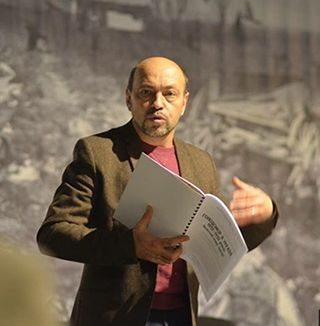Ukrainian Parliament Office Hosts Seminar on "Where Do Human Rights Begin" Teacher's Guide
In January, the office of the Ukrainian ombudsman conducted a seminar for 30 teachers on the best practices of human rights education using USC Shoah Foundation’s multimedia teaching guide, Where Do Human Rights Begin: Lessons of History and Contemporary Approaches.
The guide was a multi-national collaboration between USC Shoah Foundation; VAAD, the association of Jewish organizations and communities of Ukraine; and the German Foundation Remembrance, Responsibility and Future (EVZ)’s “Teaching Human Rights” program. It uses excerpts of testimonies by survivors of totalitarian regime, including Nazi Germany and Stalin’s Soviet Union, from both USC Shoah Foundation’s Visual History Archive and the EVZ’s archive.
The seminar opened with remarks from Valeriya Lutkovska, Ukrainian Parliament Commissioner for Human Rights and Ukrainian ombudsman (an official appointed to investigate individuals’ complaints against maladministration). Lutkovska announced the winners of an essay competition for high school students, “Human rights and contemporary challenges for Ukraine.” The national contest received 400 submissions from 22 regions of Ukraine, touching on topics from the right to life to human rights violations in armed conflict.

Oleksandr Voytenko, one of the authors of Where Do Human Rights Begin: Lessons of History and Contemporary Approaches, conducted the remainder of the seminar. Voytenko has experience leading such groups. He has led seminars like January’s since Ukraine’s Ministry of Education and Science first approved the teaching guide in November 2013. In April 2014, the guide was also made available online, increasing the number of educators who can now use the resource.
Where Do Human Rights Begin consists of 10 modules on topics that echo the United Nations’ Universal Declaration of Human Rights, such as “Right to Life,” “Right to a Fair Trial,” and “Rights of the Child.” Each of the modules includes video testimony, biographical information, a lesson guide, and a training page with an interactive map and photo gallery of teachers who have used the resource.
“The uniqueness of this resource for me personally is in that it reveals a new dimension of history — as that of an applied science,” Voytenko told USC Shoah Foundation in 2014. “History must teach something. Historical knowledge is meant not only to make a person smarter and more intellectual, but to teach [certain practical skills]. Through my work with the Holocaust testimony, the instrumental aspect of history of the Holocaust has become, for that very reason, of greater interest to me as a historian than its epistemic aspect. This applied aspect of history is used across the entire teacher’s guide, connecting, making parallels, and turning historic experiences into teachable moments.”
USC Shoah Foundation has strong and multifaceted connections to Ukraine. The Institute recorded 3,472 testimonies in the country, and 10,000 from survivors born in Ukraine. It has also produced four multimedia resources specifically for Ukrainian teachers.